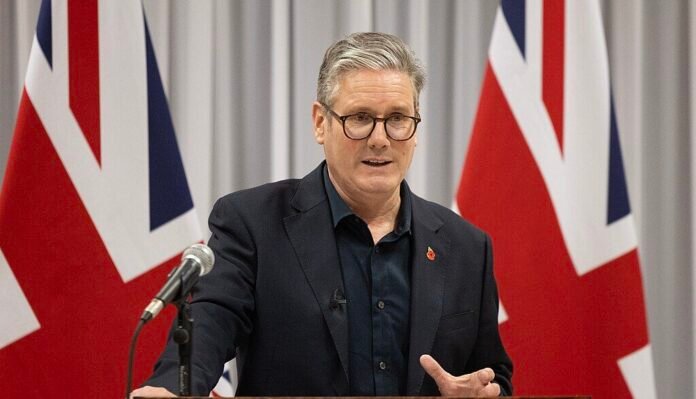Starmer warns reform’s unfunded tax cuts could send mortgage costs soaring, repeat Truss chaos
Keir Starmer has launched a fierce attack on Nigel Farage, accusing the Reform UK leader of pushing reckless tax-and-spending promises that risk unleashing a Liz Truss-style economic meltdown.
Speaking at a manufacturing business in the north-west of England, the prime minister warned that Farage’s plans would spook financial markets and drive up mortgage costs for millions of households.
“Farage is making the exact same bet Liz Truss did: that you can spend tens of billions on tax cuts without a proper way of paying for it,” Starmer said. “And, just like Truss, he is using your family finances, your mortgage, your bills as a gambling chip on his mad experiment. The result will be the same.”
Embed from Getty ImagesFarage recently unveiled bold promises targeting traditional Labour voters disillusioned by the government’s tax and benefit policies. His party vowed to scrap the two-child benefit limit and boost winter fuel payments for pensioners, among other costly pledges.
But leading economists dismissed the proposals as fantasy, highlighting a glaring mismatch between Farage’s spending ambitions and the savings he claims will pay for them.
The Institute for Fiscal Studies (IFS) estimated that raising the tax-free personal allowance alone would cost around £80 billion. Farage counters that departmental cuts, welfare savings, and abandoning the net zero target by 2050 – claimed to save £45 billion annually – would balance the books.
However, experts such as Jill Rutter from the Institute for Government cautioned that the net zero savings figure includes private sector investments, which do not reduce government spending.
Despite admitting the sums might not fully add up, Farage insisted his figures outline his party’s priorities and direction.
Labour, meanwhile, faces backlash over tough decisions overseen by Chancellor Rachel Reeves, including means-testing winter fuel payments and cutting disability support. Reeves argues these moves are necessary to repair the economic damage inherited from Conservative governments and to honour strict fiscal rules.
Starmer drew a direct parallel to the chaotic economic fallout from Liz Truss’s 2022 mini-budget, which triggered market turmoil, increased government borrowing costs, and sent mortgage rates soaring.
“In opposition, we said Liz Truss would crash the economy and leave you to pick the bill. We were right. And we were elected to fix that mess,” Starmer said. “Now in government, we are once again fighting the same fantasy – this time from Nigel Farage.”
He added: “Liz Truss bet the house and lost. £45 billion in unfunded tax cuts, with no means to pay for them. Markets reacted, the economy tanked, and we’re all still paying the price for mortgages, rents and bills that spiralled out of control.
“I won’t let that happen. Labour’s plan for change has stabilised the economy, with growth at the fastest rate in the G7 this year, four cuts to interest rates, and a pay boost for 3.5 million low-paid workers.”
Starmer’s intervention seeks to draw a clear distinction between Labour’s cautious fiscal approach and Reform’s bold tax-cutting promises, painting Farage’s proposals as a dangerous gamble with ordinary people’s finances.
BBC
Prime Minister Sir Keir Starmer is set to liken Reform UK leader Nigel Farage to former PM Liz Truss, accusing him of “fantasy” economics in a speech later today. Starmer warns that Farage’s policies, including unfunded tax cuts like raising the income tax threshold to £20,000, risk increasing mortgage costs and sparking an economic meltdown. He argues Farage is gambling with family finances just as Truss did, promising large tax cuts without clear funding. Reform UK, which gained significant ground in recent local elections, dismissed Starmer’s remarks as a desperate attack by a party lagging in the polls. The Institute for Fiscal Studies estimates Farage’s tax cut plan could cost between £50bn and £80bn annually, with no clear plan to cover costs. Farage criticised the Conservatives as “irrelevant” after Reform’s local election success, which included winning mayoralties and councillor seats, but the party’s overall vote share remains below a majority. Farage also supports scrapping the two-child benefit cap, aligning with some Labour MPs.
FINANCIAL TIMES
Nigel Farage’s Reform UK party has outlined ambitious tax cuts and spending increases, including raising the personal income tax allowance from £12,570 to £20,000, abolishing inheritance tax, and increasing the married couple’s transferable allowance. These pledges could cost the government between £50bn and £80bn annually. Farage argues these can be funded by deep cuts to government spending on the environment, asylum seeker support, and reducing the size of government. However, economists and policy experts widely dispute these savings, calling the plans unrealistic. The Shadow Chancellor, Mel Stride, criticised the pledges as “unfunded commitments with fantasy ways to pay for them.” Farage blames former PM Liz Truss’s downfall on not cutting public spending while pursuing tax cuts. The financial feasibility of Reform UK’s policies remains highly contested as the party gains electoral ground but lacks detailed funding plans.
